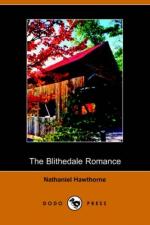The rock itself rose some twenty or thirty feet, a shattered granite bowlder, or heap of bowlders, with an irregular outline and many fissures, out of which sprang shrubs, bushes, and even trees; as if the scanty soil within those crevices were sweeter to their roots than any other earth. At the base of the pulpit, the broken bowlders inclined towards each other, so as to form a shallow cave, within which our little party had sometimes found protection from a summer shower. On the threshold, or just across it, grew a tuft of pale columbines, in their season, and violets, sad and shadowy recluses, such as Priscilla was when we first knew her; children of the sun, who had never seen their father, but dwelt among damp mosses, though not akin to them. At the summit, the rock was overshadowed by the canopy of a birch-tree, which served as a sounding-board for the pulpit. Beneath this shade (with my eyes of sense half shut and those of the imagination widely opened) I used to see the holy Apostle of the Indians, with the sunlight flickering down upon him through the leaves, and glorifying his figure as with the half-perceptible glow of a transfiguration.
I the more minutely describe the rock, and this little Sabbath solitude, because Hollingsworth, at our solicitation, often ascended Eliot’s pulpit, and not exactly preached, but talked to us, his few disciples, in a strain that rose and fell as naturally as the wind’s breath among the leaves of the birch-tree. No other speech of man has ever moved me like some of those discourses. It seemed most pitiful—a positive calamity to the world—that a treasury of golden thoughts should thus be scattered, by the liberal handful, down among us three, when a thousand hearers might have been the richer for them; and Hollingsworth the richer, likewise, by the sympathy of multitudes. After speaking much or little, as might happen, he would descend from his gray pulpit, and generally fling himself at full length on the ground, face downward. Meanwhile, we talked around him on such topics as were suggested by the discourse.
Since her interview with Westervelt, Zenobia’s continual inequalities of temper had been rather difficult for her friends to bear. On the first Sunday after that incident, when Hollingsworth had clambered down from Eliot’s pulpit, she declaimed with great earnestness and passion, nothing short of anger, on the injustice which the world did to women, and equally to itself, by not allowing them, in freedom and honor, and with the fullest welcome, their natural utterance in public.




